detective stories(广东省深圳市宝安区)
文档属性
| 名称 | detective stories(广东省深圳市宝安区) | 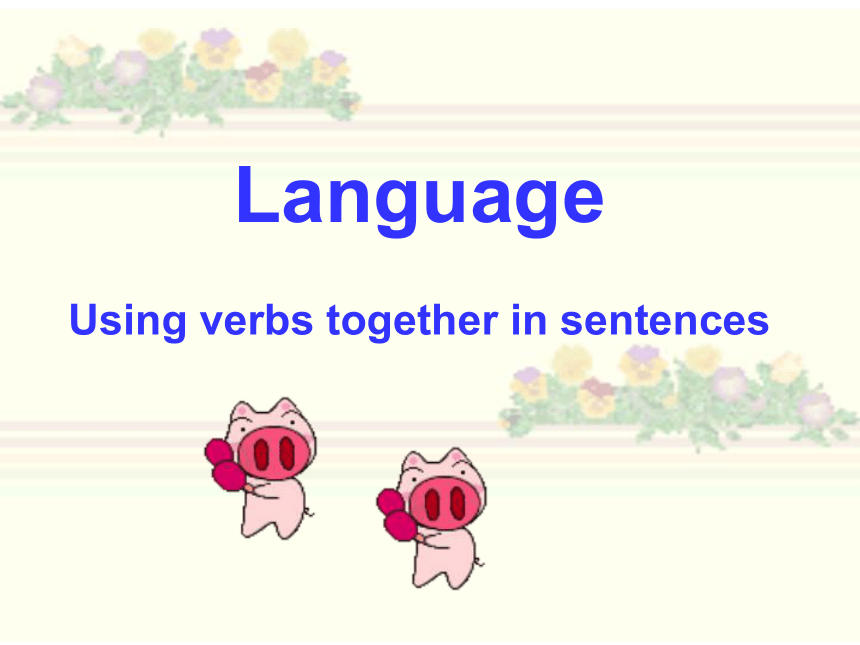 | |
| 格式 | rar | ||
| 文件大小 | 51.0KB | ||
| 资源类型 | 教案 | ||
| 版本资源 | 牛津译林版 | ||
| 科目 | 英语 | ||
| 更新时间 | 2007-09-28 18:15:00 | ||
图片预览

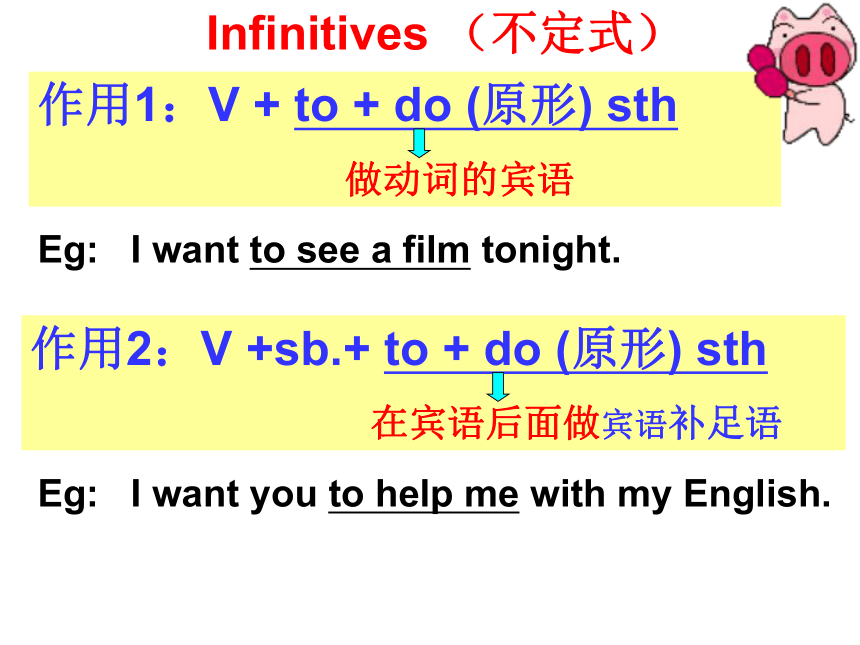
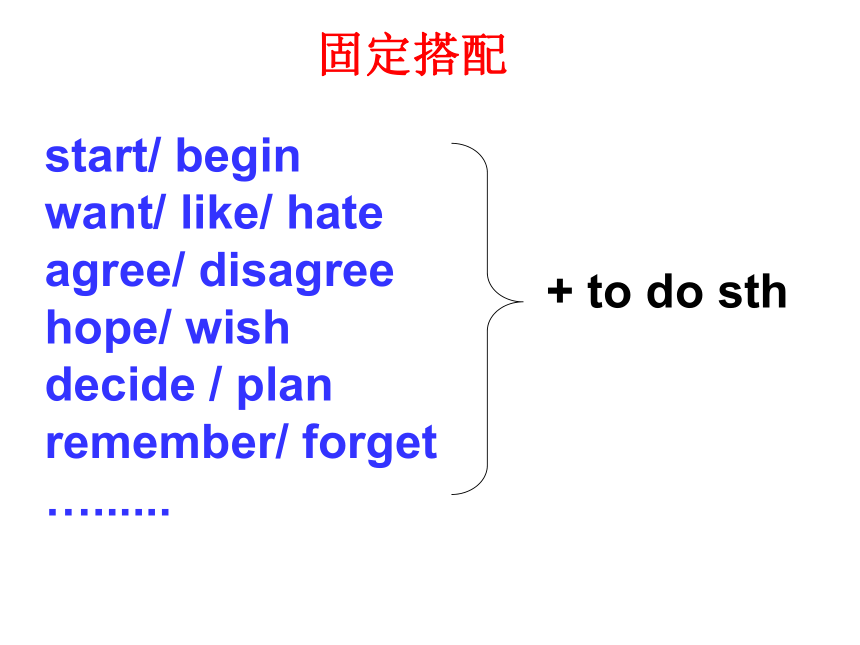

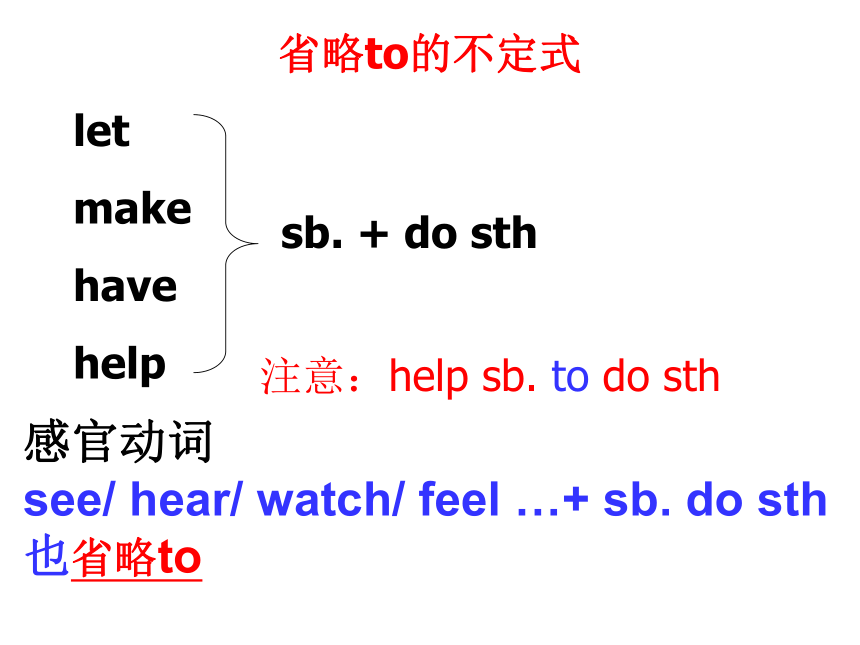
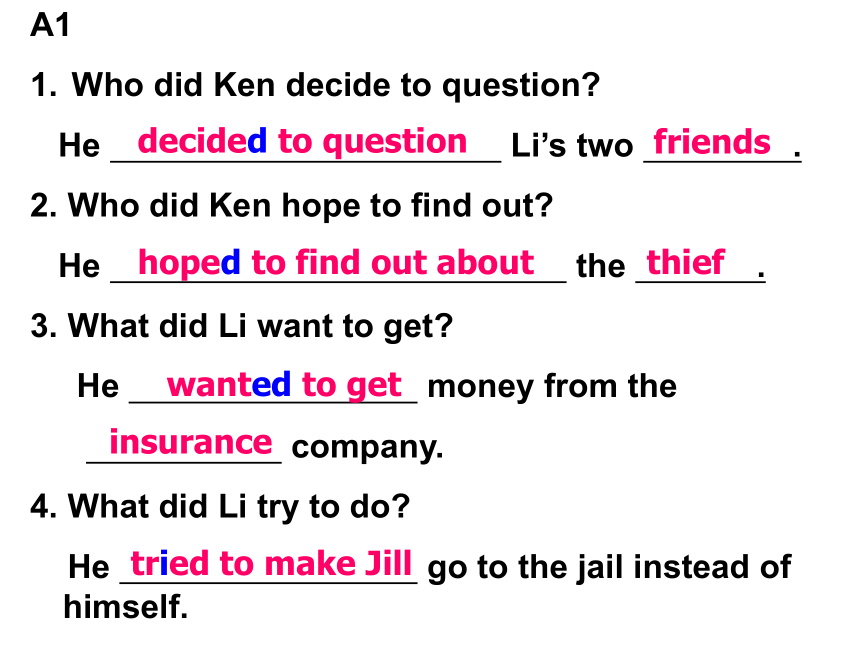
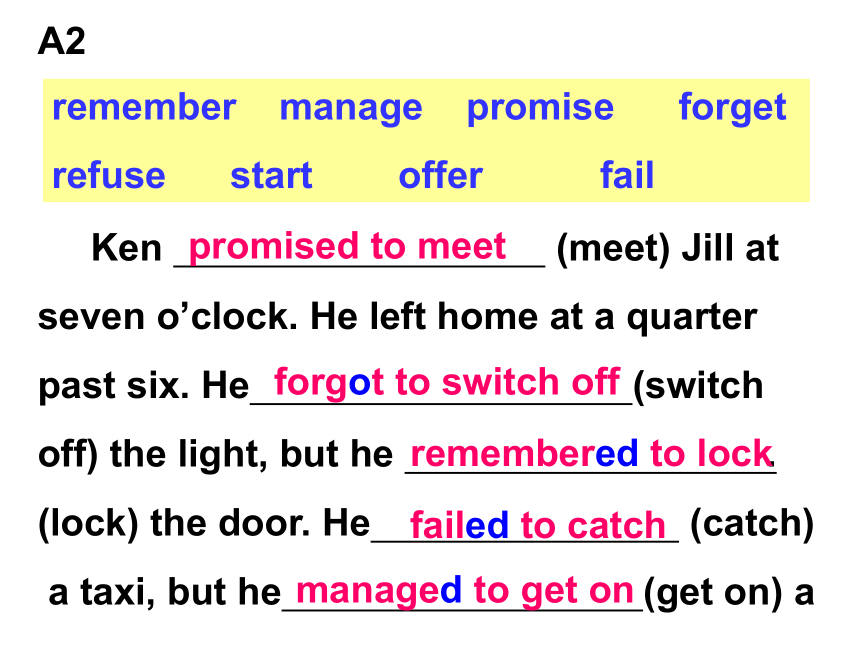

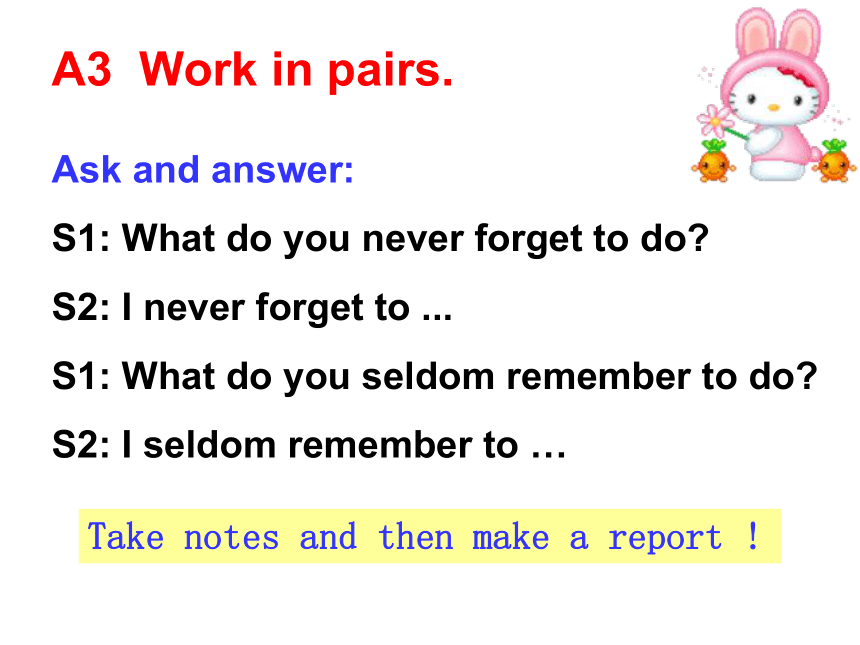
文档简介
课件26张PPT。Language
Using verbs together in sentencesInfinitives (不定式)作用1:V + to + do (原形) sth
做动词的宾语 Eg: I want to see a film tonight.作用2:V +sb.+ to + do (原形) sth
在宾语后面做宾语补足语 Eg: I want you to help me with my English.
start/ begin
want/ like/ hate
agree/ disagree
hope/ wish
decide / plan
remember/ forget
…......+ to do sth固定搭配ask / tell
want
warn
persuade
wait for
……+ sb. to do + sb. not to do 省略to的不定式
let
make
have
helpsb. + do sth注意:help sb. to do sth感官动词
see/ hear/ watch/ feel …+ sb. do sth
也省略toA1
Who did Ken decide to question?
He Li’s two .
2. Who did Ken hope to find out?
He the .
3. What did Li want to get?
He money from the
company.
4. What did Li try to do?
He go to the jail instead of himself.decided to questionfriendshoped to find out aboutthiefwanted to getinsurancetried to make JillA2
Ken (meet) Jill at
seven o’clock. He left home at a quarter
past six. He (switch
off) the light, but he .
(lock) the door. He (catch)
a taxi, but he (get on) a promised to meetforgot to switch offremembered to lockfailed to catchmanaged to get onremember manage promise forget
refuse start offer failbus. He arrive at the cinema early and
went into a bookshop.
He (read) a book an
forgot the time. He was late meeting Jill.
She (speak) to him at first.
He (buy) her some
chocolate. She was pleased, and they
went in to see the film.started to readrefused to speakoffered to buyA3 Work in pairs.
Ask and answer:
S1: What do you never forget to do?
S2: I never forget to ...
S1: What do you seldom remember to do?
S2: I seldom remember to …Take notes and then make a report !Genrunds (动名词)admit / deny
enjoy / like / hate/ dislike
start/ begin/ stop
mind
practise
suggest
keep / continue
…… V + doing sth
做动词的宾语 + doing sth动词词组后接doing
prefer doing sth to doing sth
be used to doing sth
be busy doing sth
look forward to doing sth
what/ how about doing sth
be afraid of doing sth
be good at/ do well in doing sth
can't help doing sth
…….
(在这些词组中to为介词, 而不是不定式的to)B1
What does Li enjoy doing?
He things.
2. What did Li’s friends deny doing?
They .
3. What did Li admit doing?
He .enjoys collectingdenied stealing the vaseadmitted stealing his own vaseB2 Ken gets to know more about Jill. He reaches some conclusions about her. Look at the pictures below and on Page 10, and complete Ken’s conclusions. Use the verbs in the box with other vers in the --ing form.practise suggest finish enjoy
hate love like goShe l to music.
She e .
She l .
She h for people.ikes listenningnjoys painting / drawingoves dancingates waitingoes shopping5. She often g .
6. She often p .
7. She often s hills.
8. She often eats something when
she f a book.
ractises singinguggests climbinginishes readingB3 work in pairs. What did your partner enjoy doing when he or she was young but does not enjoy doing now? find out two things and then complete these sentences.
enjoyed when he/she
was young, but he / she does not enjoy
now.
2. He/She also enjoyed when
young, but not
now.B4 Here is a note from Ken to Jill. Compelte it using the verbs in the brackets. Put the second verb in the to form or the –ing form.
Dear Jill,
I know that I you to dinner tonight
at six o’clock, but I won’t untill six
thirty. So I can meet you at seven in the Golden Egg
Restaurant. I know that you don’t .
late, but please forgive me. We can after
dinner if you like. I a new pair of jeans.
Kenpromised to takefinish workinglike eating/ to eatgo shoppingwant to buy难点1:
某些动词后面既可用不定式又可用动名词
他们所表达的意思不同:
For example:
like/ love/hate + to do sth
like/ love/hate + doing sth
remember/ forget + to do sth
remember/ forget+ doing sth长期的/习惯性的具体的某一次的记得/忘记去做…记得/忘记做过…see sb. do sth
see sb. doing sth
hear sb. do sth
hear sb. doing sth
watch sb. do sth
watch sb. doing sth看见sb做sth (经常的)看见sb正在做sthtry to do sth
try doing sth
stop to do sth
stop doing sth
sb/ sth begin/start to do sth
Sb. begin/start doing sth尝试去做…尽力去做…(不管结果如何)停下来去做…停止做(原来在做的事)进行时 / 后接know, understand这类动词时 (只能是人作主语)开始一种长期活动或开始一种习惯 …Speaking A Talk time
〔W〕 〔V〕
A1 Read these words
1 we west wines
2 v vest vines
we v west vet wines vines
A2 Practise reading the following
last Wednesday
a vase last Wednesday
viewed a valuable vase last Wednesday
Winnie went and viewed a valuable vase
last WednesdayA3 read the following
Willie’s vest is very wet.
Victor’s vest is made of wool.
Victor’s body is very warm.
Willie’s body is very cool.A4 When we read words of more than one syllable, we stress one of the syllables. always seven window never overA5 Read these two-syllable words, stressing the first syllable.believe convince unwell aware deviceA6 Read these two-syllable words and underline the stressed syllables.beware vacant volume warmest
invite awake divide very withoutB Speak up
A role-play game: questioning a suspect
Last night, there was a theft between 6 and 11 p.m. Michael and Andrew may be the thieves. Detective Ken questions them separately. You can see part of each interview below and on page 13.
B1 Work in pairs. Read the dialogues aloud. Then find some differences between Michael’s story and Andrew’s story.B2 Now work in groups of four. S1 and S2 must pretend to be the thieves. They stole something from a shop last night. Now they must make up a false story. Go away from S3 and S4, and discuss the details of your story. S3 and S4 are detectives. They must write a list of questions to ask S1 and S2. use the dialogues in B1 to help you. Here are some more useful questions.When……? Where……?
Why…….? How……?
Who…..? How much ……?
How many people…..?B3 After 5 minutes, the detectives must question S1 and S2 separately. The detectives must try to find some differences between the two stories. S1 and S2 must try to fool the detectives!
Using verbs together in sentencesInfinitives (不定式)作用1:V + to + do (原形) sth
做动词的宾语 Eg: I want to see a film tonight.作用2:V +sb.+ to + do (原形) sth
在宾语后面做宾语补足语 Eg: I want you to help me with my English.
start/ begin
want/ like/ hate
agree/ disagree
hope/ wish
decide / plan
remember/ forget
…......+ to do sth固定搭配ask / tell
want
warn
persuade
wait for
……+ sb. to do + sb. not to do 省略to的不定式
let
make
have
helpsb. + do sth注意:help sb. to do sth感官动词
see/ hear/ watch/ feel …+ sb. do sth
也省略toA1
Who did Ken decide to question?
He Li’s two .
2. Who did Ken hope to find out?
He the .
3. What did Li want to get?
He money from the
company.
4. What did Li try to do?
He go to the jail instead of himself.decided to questionfriendshoped to find out aboutthiefwanted to getinsurancetried to make JillA2
Ken (meet) Jill at
seven o’clock. He left home at a quarter
past six. He (switch
off) the light, but he .
(lock) the door. He (catch)
a taxi, but he (get on) a promised to meetforgot to switch offremembered to lockfailed to catchmanaged to get onremember manage promise forget
refuse start offer failbus. He arrive at the cinema early and
went into a bookshop.
He (read) a book an
forgot the time. He was late meeting Jill.
She (speak) to him at first.
He (buy) her some
chocolate. She was pleased, and they
went in to see the film.started to readrefused to speakoffered to buyA3 Work in pairs.
Ask and answer:
S1: What do you never forget to do?
S2: I never forget to ...
S1: What do you seldom remember to do?
S2: I seldom remember to …Take notes and then make a report !Genrunds (动名词)admit / deny
enjoy / like / hate/ dislike
start/ begin/ stop
mind
practise
suggest
keep / continue
…… V + doing sth
做动词的宾语 + doing sth动词词组后接doing
prefer doing sth to doing sth
be used to doing sth
be busy doing sth
look forward to doing sth
what/ how about doing sth
be afraid of doing sth
be good at/ do well in doing sth
can't help doing sth
…….
(在这些词组中to为介词, 而不是不定式的to)B1
What does Li enjoy doing?
He things.
2. What did Li’s friends deny doing?
They .
3. What did Li admit doing?
He .enjoys collectingdenied stealing the vaseadmitted stealing his own vaseB2 Ken gets to know more about Jill. He reaches some conclusions about her. Look at the pictures below and on Page 10, and complete Ken’s conclusions. Use the verbs in the box with other vers in the --ing form.practise suggest finish enjoy
hate love like goShe l to music.
She e .
She l .
She h for people.ikes listenningnjoys painting / drawingoves dancingates waitingoes shopping5. She often g .
6. She often p .
7. She often s hills.
8. She often eats something when
she f a book.
ractises singinguggests climbinginishes readingB3 work in pairs. What did your partner enjoy doing when he or she was young but does not enjoy doing now? find out two things and then complete these sentences.
enjoyed when he/she
was young, but he / she does not enjoy
now.
2. He/She also enjoyed when
young, but not
now.B4 Here is a note from Ken to Jill. Compelte it using the verbs in the brackets. Put the second verb in the to form or the –ing form.
Dear Jill,
I know that I you to dinner tonight
at six o’clock, but I won’t untill six
thirty. So I can meet you at seven in the Golden Egg
Restaurant. I know that you don’t .
late, but please forgive me. We can after
dinner if you like. I a new pair of jeans.
Kenpromised to takefinish workinglike eating/ to eatgo shoppingwant to buy难点1:
某些动词后面既可用不定式又可用动名词
他们所表达的意思不同:
For example:
like/ love/hate + to do sth
like/ love/hate + doing sth
remember/ forget + to do sth
remember/ forget+ doing sth长期的/习惯性的具体的某一次的记得/忘记去做…记得/忘记做过…see sb. do sth
see sb. doing sth
hear sb. do sth
hear sb. doing sth
watch sb. do sth
watch sb. doing sth看见sb做sth (经常的)看见sb正在做sthtry to do sth
try doing sth
stop to do sth
stop doing sth
sb/ sth begin/start to do sth
Sb. begin/start doing sth尝试去做…尽力去做…(不管结果如何)停下来去做…停止做(原来在做的事)进行时 / 后接know, understand这类动词时 (只能是人作主语)开始一种长期活动或开始一种习惯 …Speaking A Talk time
〔W〕 〔V〕
A1 Read these words
1 we west wines
2 v vest vines
we v west vet wines vines
A2 Practise reading the following
last Wednesday
a vase last Wednesday
viewed a valuable vase last Wednesday
Winnie went and viewed a valuable vase
last WednesdayA3 read the following
Willie’s vest is very wet.
Victor’s vest is made of wool.
Victor’s body is very warm.
Willie’s body is very cool.A4 When we read words of more than one syllable, we stress one of the syllables. always seven window never overA5 Read these two-syllable words, stressing the first syllable.believe convince unwell aware deviceA6 Read these two-syllable words and underline the stressed syllables.beware vacant volume warmest
invite awake divide very withoutB Speak up
A role-play game: questioning a suspect
Last night, there was a theft between 6 and 11 p.m. Michael and Andrew may be the thieves. Detective Ken questions them separately. You can see part of each interview below and on page 13.
B1 Work in pairs. Read the dialogues aloud. Then find some differences between Michael’s story and Andrew’s story.B2 Now work in groups of four. S1 and S2 must pretend to be the thieves. They stole something from a shop last night. Now they must make up a false story. Go away from S3 and S4, and discuss the details of your story. S3 and S4 are detectives. They must write a list of questions to ask S1 and S2. use the dialogues in B1 to help you. Here are some more useful questions.When……? Where……?
Why…….? How……?
Who…..? How much ……?
How many people…..?B3 After 5 minutes, the detectives must question S1 and S2 separately. The detectives must try to find some differences between the two stories. S1 and S2 must try to fool the detectives!
